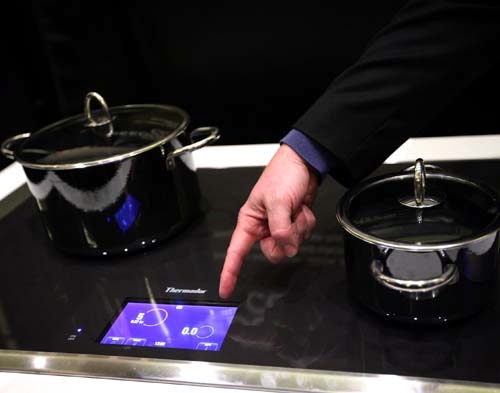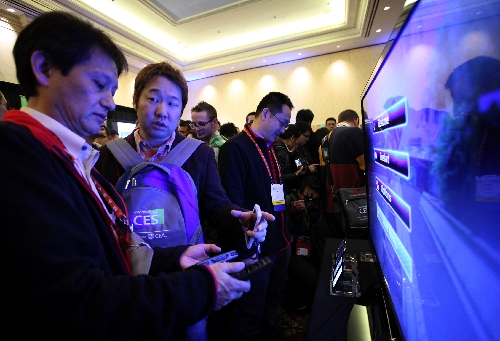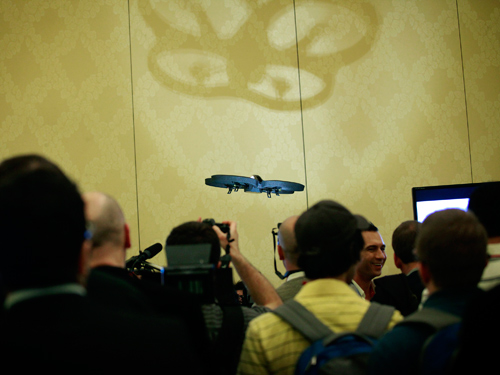CES: Get ready for an invasion of ‘smart’ home electronics
Your home electronics will soon be smarter than you, if a Sunday preview of the 2012 International Consumer Electronics Show is any indication.
The key word at the CES Unveiled press event was "smart." There were smart kitchen cooktops, smart toys, smart cameras and an in-vehicle accessories company that exhorts consumers to "drive smarter" with "social networking for the road."
Mind-blowing new technology and radically different products aren't expected at this year's show, which officially opens Tuesday at the Las Vegas Convention Center and is expected to attract 140,000 attendees from around the globe.
Instead, the world's largest consumer electronics companies are expected to unveil smarter products that build on existing technology -- more tablets, more 3-D TVs and more Internet-connected everything.
Shawn Dubravac, chief economist and director of research for the Consumer Electronics Association, said the addition of computing to traditionally noncomputing products such as televisions, stereos and thermostats, is one of the biggest trends conventioneers will see this year.
Thermador was demonstrating a full-surface induction appliance with natural mapping user interface -- or, in layman's terms, a smart cooktop stove -- at CES Unveiled. Instead of traditional stovetop burners, the cooktop's glossy black surface has computers that sense where pots and plans are placed. The next-gen stove can be yours in July for $4,949.
Consumers now expect big-ticket appliances to add high-tech features, but even low-cost, traditional items are getting smarter. Case in point: Backpacks have been around forever, but the new Powerbag will also charge your laptop while you're lugging it.
"There are very strong evolutionary patterns when it comes to technology," Dubravac said during a presentation on CES trends for 2012.
The product cycle happens as follows: birth, complexity, then simplification.
ENDLESS OPTIONS
As gadgets have become increasingly complicated, with more buttons and endless options for customization, companies are beginning to simplify the user interface. That's another trend Dubravac expects to see at this year's convention.
Tablets are a prime example. More than 100 tablet models debuted at CES 2011. Critics said the technology was really nothing new, but the advancement was in the form of a refinement -- size -- that appeals to consumers.
"One of the big concerns about tablets was that it didn't change the experience, it just changed the real estate," Dubravac said. "These devices don't need to be completely, radically different from what's out in the marketplace, as long as they provide a somewhat different experience."
Consumers are clearly embracing a fresh spin on established technology. Worldwide tablet sales may exceed 100 million this year, according to estimates by GfK Boutique Research, a global tech market research firm.
Tablets aren't taking away from laptop sales, Steve Bambridge, GfK's global business director, noted during a Sunday presentation on global consumer electronics trends. Rather, tablets are affecting sales of netbooks, which were all the rage at CES just a few years ago.
ULTRABOOKS
Tablets will be present at the show this year, as will 30 to 50 ultrabooks, super-slim, lightweight laptops with flash drives popularized by Apple's Macbook Air.
Evolution has its benefits, but there can also be pain for those who fail to evolve.
U.S. sales of consumer electronics fell 5.9 percent this past holiday season, as smartphones cannibalize sales of standalone gadgets such as cameras, camcorders and GPS navigation devices.
The NPD Group reported Sunday that electronics sales, including TVs and PCs, totaled $9.5 billion in the five weeks ending Dec. 24.
Camcorder sales plunged 43 percent, and sales of digital picture frames fell 38 percent. GPS units slumped 33 percent. PC and TV sales slipped just 4 percent, bolstered by sales of TVs bigger than 50 inches. Cellphone sales are not included in the report.
Some 20,000 products will debut at CES this year, but a slim margin will become commercial successes. None of the tablets introduced at CES in 2011 exploded the way the iPad did.
"So often we're focused on the things we see at CES and having them show up in the marketplace in 2012 and be commercially viable and commercially successful,'' Dubravac said. "If they're not, we tend to write them off rather quickly.
"This year, you'll see things that will take many years until they become commercially viable,'' Dubravac said.
So if you don't know anyone with a 3-D TV, give it time. Perhaps you'll soon be the only one on the block without one.
Price is a big factor in the slow adoption of 3-D TVs, which run close to $1,000 on the lower end, not including the price of glasses. For a family that recently upgraded to a flat-screen, switching to 3-D would likely break the bank.
But those prices will eventually come down, just as they did for plasmas and flat-screens.
It took about a decade for consumers to embrace digital TVs, which were big at CES from 1997 to 2000, Dubravac said.
"We are entering the second phase -- the next 10 years -- of that digital transition," Dubravac said. "The average household today has about 25 consumer electronics products. The next big step is taking advantage of those devices."
Developing countries like China and India will drive global sales of consumer electronics above $1 trillion this year for the first time, even as cash-strapped shoppers in the United States and Western Europe ease off spending for high-tech gear, industry analysts said.
GLOBAL GADGET SALES
Developing countries will account for 46 percent of global gadget sales in 2012, up from 37 percent four years ago, Bambridge said. That estimate of 2012 global electronics sales, at $1.038 trillion, represents growth of 5 percent from last year. That compares to growth of 8 percent from 2010 to 2011.
Consumers in China and other developing Asian countries, Latin America and Central and Eastern Europe are snapping up high-tech goods as they climb toward a middle-class lifestyle.
Sales of smartphones and tablets are expected to remain strong in all markets, to the exclusion of other devices.
"We'll see most product categories slowing down or going into contraction," Bambridge said. "Smartphones and tablets are "sucking up consumer spending."
The Associated Press contributed to this report. Contact reporter Caitlin McGarry at cmcgarry @reviewjournal.com or 702-387-5273. Follow her on Twitter @Caitlin_McGarry.
Follow Las Vegas Review-Journal reporters covering the International Consumer Electronics Show live on Twitter:
Laura Carroll: @lscvegas
Caitlin McGarry: @Caitlin_McGarry
Chris Sieroty: @sierotyfeatures



















